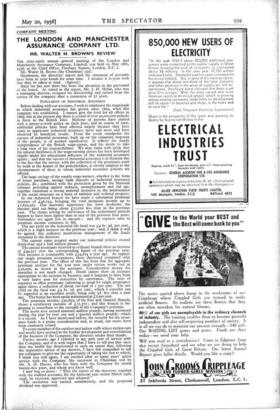COMPANY MEETING
THE LONDON AND MANCHESTER ASSURANCE COMPANY LTD.
MR. WALTER H. BROWN'S REVIEW THE sixty-ninth annual general meeting of the London and Manchester Assurance Company, Limited, was held on May 18th, 1938, at the Chief Office, Finsbury Square, London, E.C. 2.
Mr. Walter H. Brown (the Chairman) said : Gentlemen, the directors' report and the statement of accounts have been in your hands for some time. I assume it is your wish that they be taken as read. (Agreed.) Since we last met there has been one alteration in the personnel of the board. As stated in the report, Mr. J. H. Millar, who was a managing director, resigned his directorship and retired from the service of the company after a connexion of 37 years.
POPULARITY OF INDUSTRIAL ASSURANCE Before dealing with our accounts, I wish to emphasise the magnitude to which industrial assurance has grown since 1869, when this company was established. I cannot give the total for all offices in 1869, but at the present day there is a total of over 9o,000,000 policies in force in the British Isles. Millions of persons have started with a penny-a-week policy on their lives, and in course of time, additional policies have been effected largely because they have come to appreciate industrial assurance more and more and have observed its beneficial results. From the social standpoint the success of industrial assurance, built up on the voluntary response of the people, is of marked significance. It reflects the sturdy independence of the British wage-earner, and his desire to take a long view of his responsibilities. We may claim with pride that the natural thriftiness of the wage-earning classes has been developed largely under the educational influence of the industrial assurance agents ; and that the success of industrial assurance is in themain due to the fact that the service, with the collection of the premiums week by week at the homes of ihe policyholders, is closely adapted to the circumstances of those to whom industrial assurance policies are offered.
The large savings of the weekly wage-earners, whether in the form of house purchase, savings bank deposits or industrial assurance policies, &c., combined with the protection given by the National schemes providing against sickness, unemployment and old age, together constitute a strong material incentive to the maintenance of the social structure on a basis of stability and ordered progress.
In our industrial branch we have made a substantial premium increase of £46,734, bringing the total premium income up to £1,850,265. Our mortality experience has been moderate, the amount paid out -being about £12,000 less than in the previous year. The claims arising by survivance of the endowment periods happen to have been lighter than in any of the previous four years. Surrenders are again low in amount ; and the expense ratio to premium income continues to fall.
The net yield on the industrial life fund was £4 6s. 9d. per cent., which is a slight increase on the previous year ; and, I think it will be agreed, this indicates meritorious management of the funds entrusted to the directors.
The current sums assured under our industrial policies exceed thirty-four and a half million pounds.
The annual premiums received in ordinary branch show an increase of £49,527 over the corresponding figure of the previous year. This increase is comparable with £54,204 a year ago. As regards our single premium acceptances, these decreased compared with the previous year. The effect of this has been that the aggregate premium increase for the year now under review works out at £20,056, as shown in the accounts. Consideration money for annuities is not much changed. Death claims show an increase appropriate to the increase in business, and it happens to have been a very heavy year for maturities by survivance. The ratio of expenses to office premiums (adjusting as usual for single premiums) again shows a reduction of about one-half of 1 per cent. The net yield on the fund was £4 6s. 2d. per cent., which I consider can be regarded as an excellent result, being only 3d. less than a year ago. The bonus has been easily maintained at £2 per cent.
The premium income, k9o,62o, of the Fire and General Branch, shows a satisfactory increase of £11,370 ; and this branch is be- ginning to contribute to the strength of the Company's activities.
The assets now exceed nineteen million pounds, having increased during the year by over one and a quarter million pounds, which is a record. As I have mentioned before, the security for the assur- ance funds is a prime consideration and, as usual, our assets have been cautiously valued.
To every member of the outdoor and indoor staffs whose endeavours and results have assisted in the further development and consolidation of the business of the Company, the directors tender their thanks.
Twelve months ago I referred to my 50th year of service with the Company, and it is with regret that I have to tell you that since then my health has deteriorated to such an extent that, following the imperative advice of my doctors, I have felt compelled to ask my colleagues to give me the opportunity of taking the rest to which, I think you will agree, I am entitled after so many years' active service with the Company. My successor as Chairman will be Mr. A. H. Dawes, who has been with the Company for nearly twenty-five years, and whom you know well. I now beg to move : " That the report of the directors, together with the audited accounts, for the financial year ended March 24th, 1938, be received, approved and adopted." The resolution was carried unanimously, and the proposed dividend was approved.


















































 Previous page
Previous page